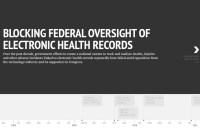Latest KFF Health News Stories
Doctors Increasingly See AI Scribes in a Positive Light. But Hiccups Persist.
Patients say they find AI summaries of doctor visits user-friendly, but it’s not clear if their appointments are improving. In any case, doctors appear to be embracing the high-tech innovation.
Cada vez más médicos ven con buenos ojos a los asistentes de IA. Pero aún hay tropiezos
Los médicos están considerando a estos asistentes de IA ambiental como una herramienta revolucionaria que les permite concentrarse en sus pacientes en lugar de en el teclado.
California enfrenta barreras al querer frenar redadas del ICE en entornos de salud
El gobernador demócrata Gavin Newsom promulgó el mes pasado la ley SB 81, que prohíbe a los centros médicos permitir el acceso de agentes federales a áreas privadas sin una orden judicial o de registro válidas.
California Faces Limits as It Directs Health Facilities To Push Back on Immigration Raids
California now has a law requiring hospitals and clinics to improve patient privacy and have clear protocols for handling requests by immigration agents. Legal experts say the state can’t fully protect immigrant patients, because federal authorities are allowed in public places, including hospital lobbies, general waiting areas, and parking lots.
An Outdated Tracking System Is a Key Factor in Texas’ Foster Care Shortcomings
The computer program, designed in 1996 to be a secure location for foster children’s medical and school records and histories of neglect and abuse, is older than Google — and has had far fewer updates.
How Medicare Advantage Plans Dodged Auditors and Overcharged Taxpayers by Millions
Facing rare scrutiny from federal auditors, some Medicare Advantage health plans failed to produce any records to justify their payments, government records show. The audits revealed millions of dollars in overcharges to Medicare over three years.
Blind to Problems: How VA’s Electronic Record System Shuts Out Visually Impaired Patients
Veterans Affairs’ electronic health records aren’t friendly to blind- and low-vision users, whether they’re patients or employees. It’s a microcosm of America’s health care system.
Reporter Follows Up on ‘Cancer Moonshot’ Progress and the Bias in Digital Health Records
KHN and California Healthline staff made the rounds on national and local media this week to discuss their stories. Here’s a collection of their appearances.
Embedded Bias: How Medical Records Sow Discrimination
Medical records can contain seemingly objective descriptions that are actually full of coded language and subtext. How does that affect care?
Big Employers Are Offering Abortion Benefits. Will the Information Stay Safe?
Work-based benefits may expand access to abortion for people who live in areas where the service is unavailable, but experts warn that claiming benefits could create a paper trail for law enforcement officials to follow.
Tech Glitches at One VA Site Raise Concerns About a Nationwide Rollout
The more than $16 billion, decade-long effort by the Department of Veterans Affairs was designed to provide seamless electronic health records for patients from enlistment in the military past discharge.
As Coronavirus Strikes, Crucial Data In Electronic Health Records Hard To Harvest
The U.S. government spent $36 billion computerizing health records, yet they’re of limited help in the COVID-19 crisis.
KHN’s ‘What The Health?’: Coronavirus Goes Viral
The rapidly spreading coronavirus has led to the cancellation of sporting events, conferences and travel, with Congress and President Donald Trump scrambling to catch up to the spiraling public health crisis. Meanwhile, the Trump administration has issued long-awaited rules aimed at making it easier for patients to carry copies of their medical records. Margot Sanger-Katz of The New York Times, Paige Winfield Cunningham of The Washington Post and Kimberly Leonard of Business Insider join KHN’s Julie Rovner to discuss this and more. Also, for extra credit, the panelists suggest their favorite health policy stories of the week they think you should read, too.
New Federal Rules Will Let Patients Put Medical Records On Smartphones
Patients would have far more control over their health care with complete medical histories stored on their phones, proponents say.
How Fast Can A New Internet Standard For Sharing Patient Data Catch Fire?
The web-based standard FHIR — pronounced “fire” — could hasten the day when we can view our full medical histories on a smartphone screen. Tech giants are hungry for a piece of the pie, but obstacles remain.
Electronic Health Records Creating A ‘New Era’ Of Health Care Fraud
The federal government funneled billions in subsidies to software vendors and some overstated or deceived the government about what their products could do, according to whistleblowers.
Timeline: History Of Blocking Regulation Of Electronic Health Records
Over the past decade, government efforts to create a national system to track and analyze deaths, injuries and other adverse incidents linked to electronic health records repeatedly have failed amid opposition from the technology industry and its supporters in Congress.
No Safety Switch: How Lax Oversight Of Electronic Health Records Puts Patients At Risk
Special interests and congressional inaction blocked efforts to track the safety of electronic medical records, leaving patients at risk.
Ahora te verá la Dra. Alexa: ¿Está Amazon preparado para venir al rescate?
Amazon se ha asociado con numerosas compañías de atención médica, incluyendo varias en California, para permitir que los clientes y empleados usen Alexa para ayudarlos con la atención médica.
Doctor Alexa Will See You Now: Is Amazon Primed To Come To Your Rescue?
Amazon, along with a host of other technology companies, is working on ways to use its smart speaker devices to bring a range of health care services into your home.























